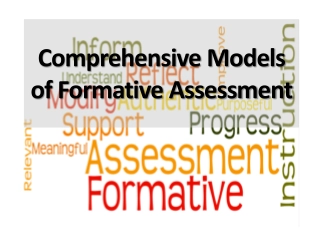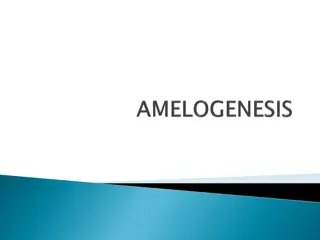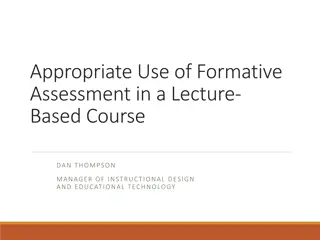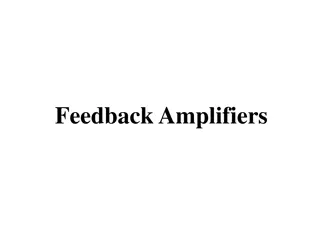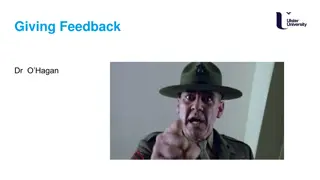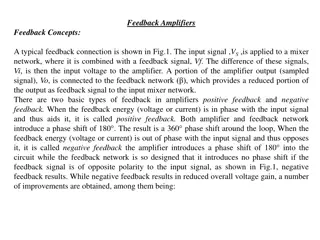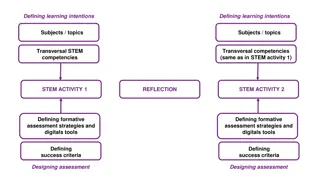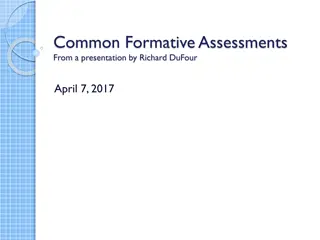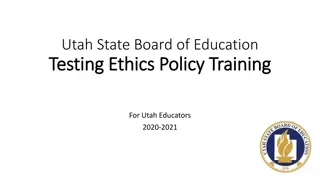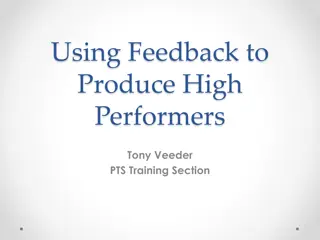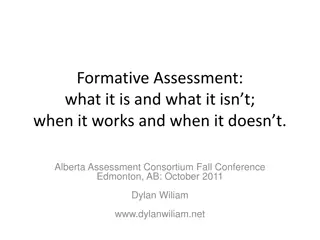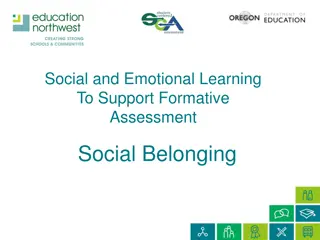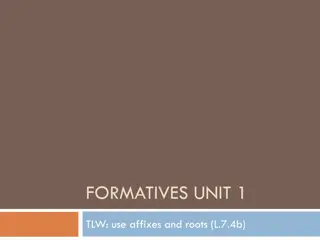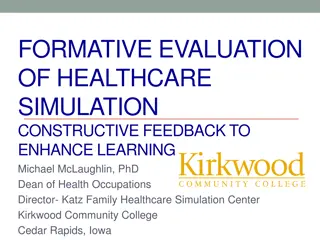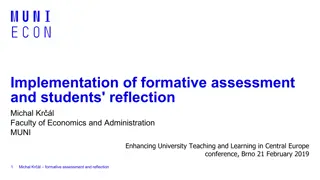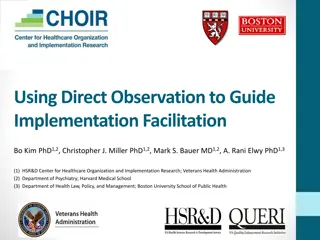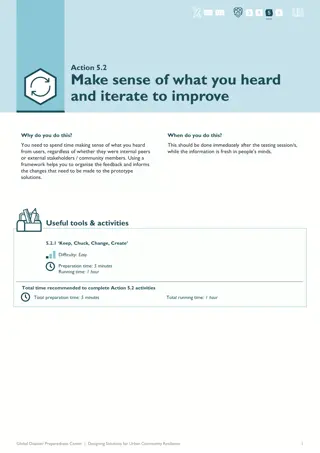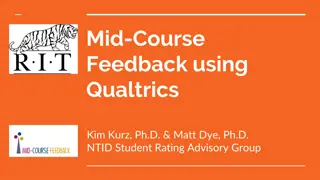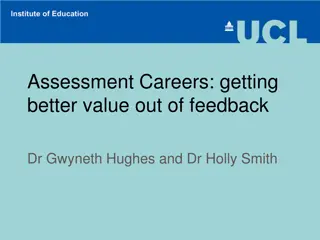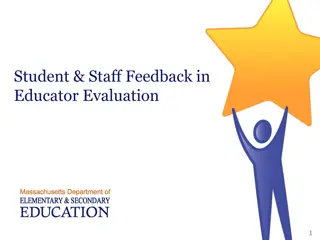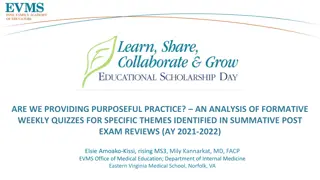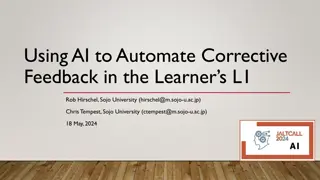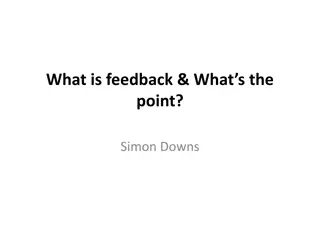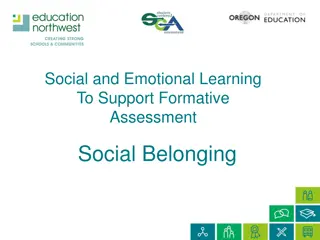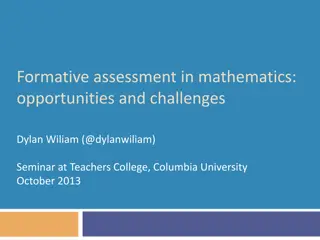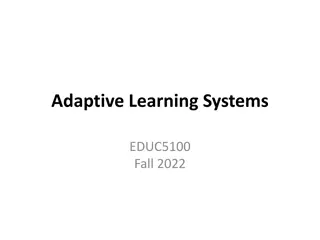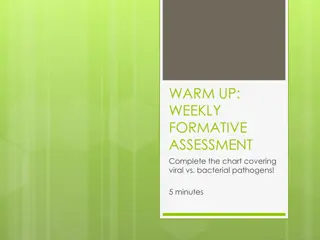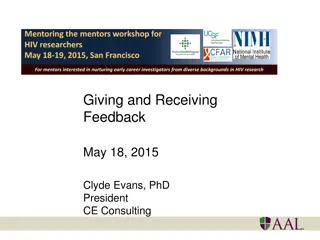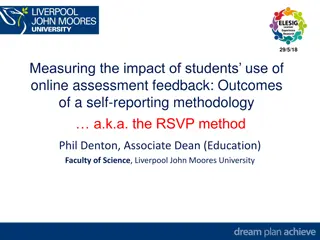Enhancing Learning with Formative Assessment Models
Explore comprehensive and theory-based models of formative assessment, such as the 7-Step Model and Tuttle's approach. Understand the importance of learning progressions to inform assessment strategies and foster student development. Discover practical techniques like pre-assessment, sharing learnin
2 views • 33 slides
Enhancing Student Learning Through Effective Feedback Strategies
Effective feedback plays a crucial role in improving student learning outcomes by providing specific information that students can use to enhance their performance. This content explores the importance of feedback, examples of good feedback practices, qualities of good feedback, and what components
5 views • 16 slides
Development Stages of Inner Enamel Epithelium
The life span of cells in the inner enamel epithelium can be divided into six stages: Morphogenic, Organizing, Formative, Maturative, Protective, and Desmolytic. Differentiation of ameloblasts occurs in various regions of the tooth germ. Amelogenesis, the enamel formation, takes place during the for
0 views • 48 slides
Effective Feedback Strategies for Learning Enhancement
Feedback plays a crucial role in the learning process. This session focuses on strategies for providing effective feedback to improve learning outcomes, course, and assignment design, best practices, and tools for efficient feedback delivery. Understanding the importance of prompt feedback and diffe
3 views • 20 slides
Enhancing Student Learning Through Formative Assessment in Lecture-Based Courses
Formative assessment is a crucial tool for improving student outcomes in lecture-based courses. It allows educators to evaluate comprehension, identify learning needs, and adjust instruction to enhance student understanding. This article explores the methods, benefits, and implementation of formativ
1 views • 14 slides
Understanding Feedback Amplifiers: Structure, Properties, and Topologies
Electronic circuits rely heavily on feedback mechanisms, particularly negative feedback, for various purposes such as desensitizing gain, reducing distortion, controlling impedance, and improving amplifier bandwidth. This article explores the general structure of feedback, properties of negative fee
0 views • 68 slides
Enhancing Feedback Practices with Audio-Visual Technology: A Study on Student Satisfaction and Attainment
This presentation delves into the implementation of Audio-Visual Feedback (AVF) technology to improve assessment feedback practices in an educational institution. The study explores the impact of AVF on student satisfaction levels compared to traditional written feedback, as well as its influence on
0 views • 21 slides
Understanding the Importance of Feedback in Achievement Enhancement
Feedback plays a crucial role in encouraging or discouraging behavior, making it essential to provide constructive feedback that focuses on growth and improvement. Improper feedback can lead to incompetence in the workplace. Learn about the definition of feedback, how to give feedback effectively, a
2 views • 22 slides
Understanding Formative Assessment in Education
Exploring the significance of formative assessment in education through insights from renowned educators like Dylan Wiliam. Delve into the essence of learning, strategies for student achievement, and the need to prioritize formative assessment for effective teaching practices.
0 views • 54 slides
Understanding Feedback Amplifiers in Electronic Circuits
Feedback amplifiers play a crucial role in electronic circuits by providing mechanisms for controlling gain, stability, and overall performance. There are two basic types of feedback - positive and negative, each offering distinct advantages. The four ways of connecting feedback signals involve volt
1 views • 18 slides
Effective Formative Assessment Strategies for STEM Learning
Explore formative assessment strategies and digital tools to enhance STEM learning outcomes. Develop success criteria, design assessments, and engage students in meaningful learning intentions. Utilize transversal STEM competencies to promote collaboration, problem-solving, critical thinking, and cr
0 views • 7 slides
Maximizing Student Growth Through Common Formative Assessments
Key concepts around common formative assessments (CFAs) are highlighted in this presentation, emphasizing the importance of shared understanding, aligning assessments with standards, and supporting student growth. The content delves into the purpose and benefits of CFAs, outlining criteria for effec
0 views • 13 slides
Challenges of Formative Assessment Implementation in Lesotho Secondary Schools: Grade 8 Arts & Entrepreneurship
Arts and Entrepreneurship (A&E) in Lesotho secondary schools face challenges in implementing formative assessment. Introduced in 2017, A&E aims to develop creative and entrepreneurial skills among students. The study investigates the impact of formative assessment in Grade 8 A&E, barriers to effecti
0 views • 12 slides
Utah Educators Testing Ethics Policy Training 2020-2021
Explore the comprehensive testing ethics policy training for Utah educators in 2020-2021 covering topics such as purpose of testing, statewide assessments, unethical practices, formative assessment tools, teaching practices before and during testing, and more. Get insights on why proper administrati
3 views • 17 slides
Enhancing Feedback Strategies in ELA Learning Project Day
Refine understanding of ELA, engage with student exemplars, and design constructive feedback in a structured agenda. Activities include generating feedback, digging deeper into feedback processes, and considering the impact of timely and specific feedback on student growth in learning and skills. Co
0 views • 31 slides
Enhancing Self-Regulation for Formative Assessment through Social and Emotional Learning
Explore the significance of self-regulation in formative assessment, understand key concepts like self-control, emotional competence, and perseverance. Discover actionable strategies to implement self-regulation interventions with students and train other adults effectively. Future orientation and s
0 views • 25 slides
Effective Feedback Strategies for Resident Teachers
Effective feedback is critical for the growth of resident teachers. This guide covers types of feedback, why it's important, what makes feedback effective, behaviorally anchored rating scales, models for giving feedback, and key tips for delivering feedback successfully.
0 views • 14 slides
Effective Feedback Strategies for High Performance
Feedback plays a crucial role in helping individuals improve performance and reach their full potential. From providing helpful feedback to reinforcing desired behaviors, this guide explores various strategies, including redirection, reinforcement, and F.A.S.T. feedback, to enhance workplace perform
0 views • 21 slides
Formative Assessment: What It Is and What It Isn't
Understanding the essence of formative assessment, this presentation explores the impact of teacher quality on student achievement, the necessity for continuous improvement, and the evolving workplace skills. It emphasizes the importance of adapting teacher practices to enhance learning outcomes. Ad
0 views • 41 slides
Fostering Social Belonging in Formative Assessment
Explore the intersection of social belonging and formative assessment in educational settings. Understand the critical role of belonging for student success and learn actionable strategies to cultivate a sense of acceptance and value among students. Discover how building safe and collaborative envir
0 views • 29 slides
Formative Unit 1 - Affixes and Roots Usage
Explore the use of affixes and roots in Formative Unit 1 with examples such as "antebellum," "antisocial," "overdue," "uniform," "monotone," and "foreshadow." Understand the meanings of prefixes like "ante," "anti," "over," "uni," "mono," and "fore," and how they alter the words they are attached to
0 views • 9 slides
Enhancing Postgraduate Academic Writing: Feedback Collaboration Model
Developing a collaborative model for postgraduate academic writing courses involves understanding the role of feedback, focusing on content feedback, and exploring the intersections between discipline specialist and writing tutor feedback to improve academic writing abilities. Feedback offers valuab
1 views • 27 slides
Enhancing Healthcare Simulation Through Constructive Feedback
Explore the principles and benefits of healthcare simulation, focusing on formative evaluation and constructive feedback to improve learning outcomes. Delve into the role of formative assessment tools, TeamSTEPPS model, and Mayo High Performance Teamwork Scale in simulation scenarios. Discover the s
0 views • 37 slides
Enhancing University Teaching through Formative Assessment and Students' Reflection
Michal Král presents a study on the implementation of formative assessment and student reflection to enhance teaching and learning in a university setting. The research explores the role of formative assessment in improving student engagement, motivation, and reflective skills. Using innovative too
0 views • 12 slides
Utilizing Direct Observation for Implementation Facilitation
This article discusses the importance of direct observation in guiding implementation facilitation processes. It emphasizes the value of formative evaluation to identify influences on implementation effectiveness. By thoroughly collecting data through mixed-methods direct observation, facilitators c
1 views • 29 slides
Iterative Feedback Framework for Prototype Improvement
The iterative feedback framework involves making sense of user feedback using the Keep, Chuck, Change, Create (KCCC) model to iterate and enhance prototype solutions. This process helps organize input from testing sessions, informing necessary modifications for better outcomes. The framework emphasi
1 views • 26 slides
Understanding Mid-Course Feedback Using Qualtrics
Mid-Course Feedback (MCF) is a valuable process that allows students to provide feedback on their courses mid-semester, impacting teaching strategies, communication, materials, and more. This feedback benefits both students and instructors by improving teaching effectiveness, student satisfaction, a
0 views • 21 slides
Enhancing Feedback Practices in Higher Education
Exploring issues and solutions related to feedback in higher education, this content discusses challenges faced by students and educators. It emphasizes the importance of constructive feedback and suggests the use of feedback response forms for both formative and summative assessments to enhance stu
0 views • 15 slides
Importance of Student and Staff Feedback in Educator Evaluation
Student and staff feedback plays a crucial role in educator evaluation, providing valuable insights into areas of strength and growth. Informed by evidence such as surveys, observations, and artifacts, feedback helps educators tailor their practice, fostering two-way communication and professional d
0 views • 14 slides
Analysis of Formative Weekly Quizzes for Summative Post-Exam Reviews (AY 2021-2022)
In this study, weekly quizzes administered to MD students at EVMS were analyzed to assess the effectiveness of formative practice for summative exams. The analysis focused on specific question types and their distribution across modules, revealing insights into the depth of understanding and integra
0 views • 11 slides
Comprehensive Guide to Training Evaluation Methods
This detailed guide covers the aim of evaluation, evaluation methods, techniques of evaluation, types of evaluation (formative, process, outcome, impact), and the significance of formative and process evaluation in assessing training effectiveness. Learn about the key principles and practices involv
0 views • 45 slides
AI Automation for Corrective Feedback in Language Learning
Exploring the utilization of AI technology to automate and enhance corrective feedback in language learning, addressing challenges such as time constraints, delayed feedback, and student comprehension. Introduction of a new AI text tool by Marcus Green for accessible and effective feedback provision
0 views • 13 slides
Understanding the Importance of Feedback in Learning and Development
Feedback plays a crucial role in providing information about performance or behavior to affirm strengths and improve weaknesses. It helps individuals become consciously competent by identifying areas for improvement through formative assessment. Effective feedback enhances motivation, promotes learn
0 views • 33 slides
Enhancing Formative Assessment Through Social Belonging
Explore the crucial link between social belonging and formative assessment in educational settings. Understand the impact of fostering a sense of acceptance and collaboration on student learning outcomes. Gain insights into actionable strategies to implement belonging interventions and create safe,
0 views • 29 slides
IEEE 802.11-19/0709r0 - Immediate and Delayed Feedback May 2019
The document discusses immediate and delayed feedback mechanisms in IEEE 802.11-19/0709r0, focusing on parameters, feedback types, and ranging options. It explores variations in feedback direction and types, proposing options for phase shift feedback and distinguishing between RSTA-to-ISTA and ISTA-
0 views • 6 slides
Insights on Formative Assessment in Mathematics
Delve into the nuances of formative assessment in mathematics through a comprehensive exploration of definitional issues, the evidence base, and key definitions. Uncover the research agenda, challenges, and opportunities in implementing and adopting formative assessment practices to enhance student
0 views • 57 slides
Understanding Feedback in Learning Systems
Exploring the role of feedback in educational settings, this content delves into the concept of providing information to learners by various agents. It discusses the importance of feedback in guiding learning progress, highlighting examples of correctness feedback and correct answer feedback. The be
0 views • 66 slides
Cell Biology Formative Assessment Activities
Engage students in interactive learning with a collection of formative assessment activities focusing on cell biology concepts such as viral vs. bacterial pathogens, homeostasis, cell membrane structure, and organelle functions. These hands-on tasks include predicting, labeling, and building cell co
0 views • 23 slides
Feedback and Mentoring Workshop for HIV Researchers
Mentoring workshop for HIV researchers focusing on giving and receiving feedback, nurturing early career investigators, and working with faculty continuum. The workshop offers insights on feedback exercises, assumptions, and rhetorical questions about feedback. Participants are encouraged to reflect
0 views • 33 slides
Maximizing Student Engagement Through RSVP Method in Online Assessment Feedback
Utilizing the RSVP methodology for online assessment feedback shows promising results in enhancing student engagement and learning outcomes. The study conducted by Phil Denton at Liverpool John Moores University indicates that incorporating RSVP into online feedback can lead to increased student res
0 views • 6 slides
